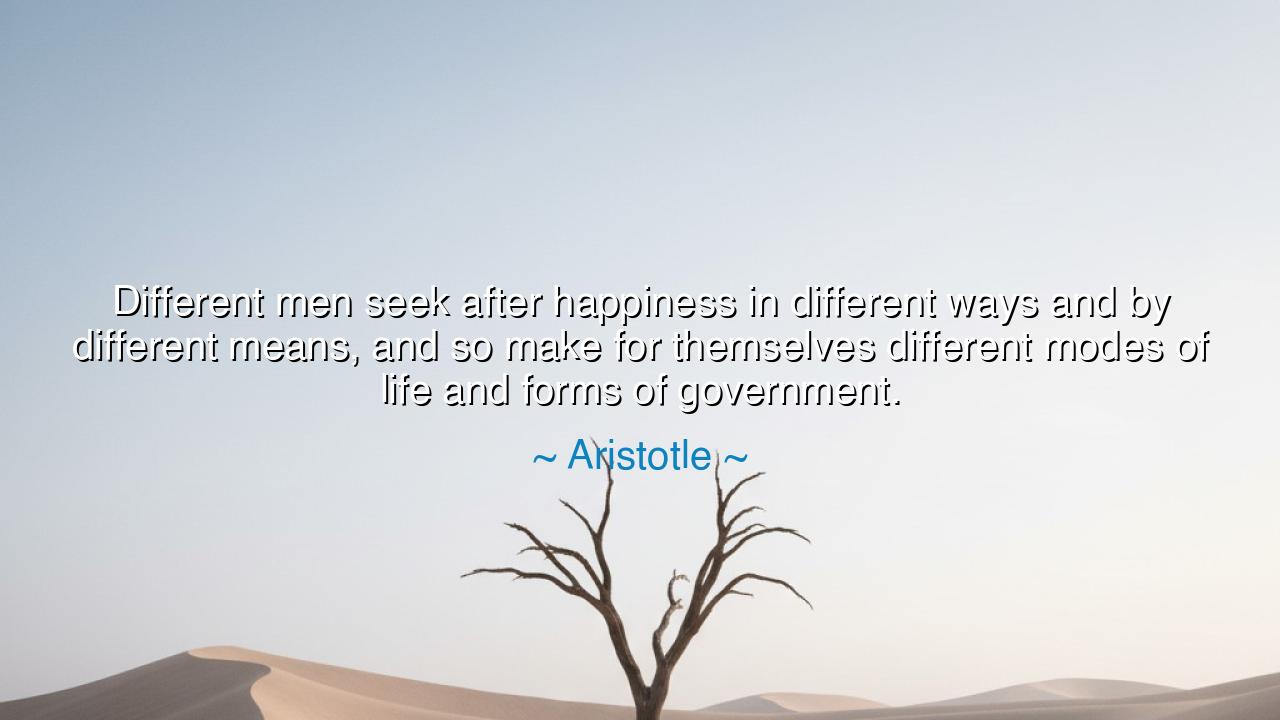
Different men seek after happiness in different ways and by
Different men seek after happiness in different ways and by different means, and so make for themselves different modes of life and forms of government.






“Different men seek after happiness in different ways and by different means, and so make for themselves different modes of life and forms of government.” — thus spoke Aristotle, the philosopher of wisdom and measure, whose words echo through the centuries as both mirror and prophecy. In this reflection, he reveals a truth that lies at the heart of human civilization: that the way a man defines happiness shapes not only his own life, but the very world he builds around him. For as individuals pursue their own vision of the good, they weave together the fabric of society, and from their diverse desires arise the many forms of life and government that mark the history of humankind.
To understand the origin of this saying, we must look to Aristotle’s great work, the Nicomachean Ethics, where he examined the nature of happiness — or eudaimonia, as the ancients called it — not as mere pleasure or comfort, but as the flourishing of the soul. To him, all men act for one ultimate purpose: to be happy. Yet what they believe happiness to be differs according to their nature and their wisdom. Some seek it in wealth, others in power, others in honor or in knowledge, and still others in virtue and contemplation. Thus, he saw that the diversity of human aims creates the diversity of human life. The merchant, the warrior, the philosopher, and the statesman each pursue their own idea of the good, and in doing so, each shapes a different mode of life.
From this diversity springs not only the character of men, but the character of nations. For a government is nothing more than the reflection of the hearts of its people. When men seek pleasure, they create societies of indulgence. When they seek power, they form kingdoms of conquest. When they seek honor, they give rise to aristocracies and codes of valor. But when they seek wisdom and virtue, they build republics of reason and justice. Aristotle, who studied the constitutions of the Greek city-states, saw how Athens, Sparta, and Thebes each mirrored the souls of their citizens. Thus, he taught that politics is not born of laws, but of values — that how we live determines how we govern.
History, too, bears witness to this eternal truth. Consider the rise of Rome, a civilization that began with the discipline of farmers and soldiers — men who sought honor, duty, and the glory of the Republic. Yet as centuries passed, their desires changed. They came to crave wealth, spectacle, and pleasure. The republic of virtue decayed into an empire of indulgence. Bread and circuses replaced philosophy and sacrifice. And as the Roman people changed their vision of happiness, so too did their government transform — from freedom to autocracy, from citizenry to servitude. Thus, the fate of a nation follows the heart of its people, just as the river follows the lay of the land.
But the lesson is not only for nations — it is for every soul. Each man, said Aristotle, builds his own form of government within himself. The mind may rule the passions as a wise monarch, or the desires may overthrow reason and seize the throne, turning the soul into a tyranny of impulse. When we seek happiness without reflection, we fall into chaos. But when we seek it through virtue, through harmony of thought and deed, we govern ourselves wisely, and from that inner order flows peace. The same is true for every household, every city, every realm: the inner life of its people determines its outer form.
There is, then, great power and great peril in how we define happiness. If we believe it lies only in pleasure, we become slaves to our appetites. If we seek it in wealth, we are never satisfied. If we chase honor, we depend on the approval of others. But if we root our happiness in virtue, in goodness of heart and strength of mind, we build lives — and nations — that endure. The courage to act justly, the discipline to think clearly, the compassion to love deeply: these are the foundations of the truest and highest happiness.
Therefore, let this teaching of Aristotle be remembered by all who seek wisdom: that the world we inhabit is the mirror of our desires. If we wish for peace, we must cultivate virtue; if we wish for freedom, we must rule ourselves before we seek to rule others. The happiness of humanity will never be found in possessions or pleasures, but in the harmony of purpose and goodness. Each generation must ask itself, What is our happiness? For the answer will shape the future.
And so, as the ancients would say, govern your soul as you would govern a city — with wisdom, with courage, and with love. Seek your happiness not in the fleeting but in the eternal, not in the shallow but in the deep. For as men’s hearts are, so too shall their nations be. And in the end, the true greatness of a people — and of a person — is measured not by what they possess, but by what they pursue.






AAdministratorAdministrator
Welcome, honored guests. Please leave a comment, we will respond soon